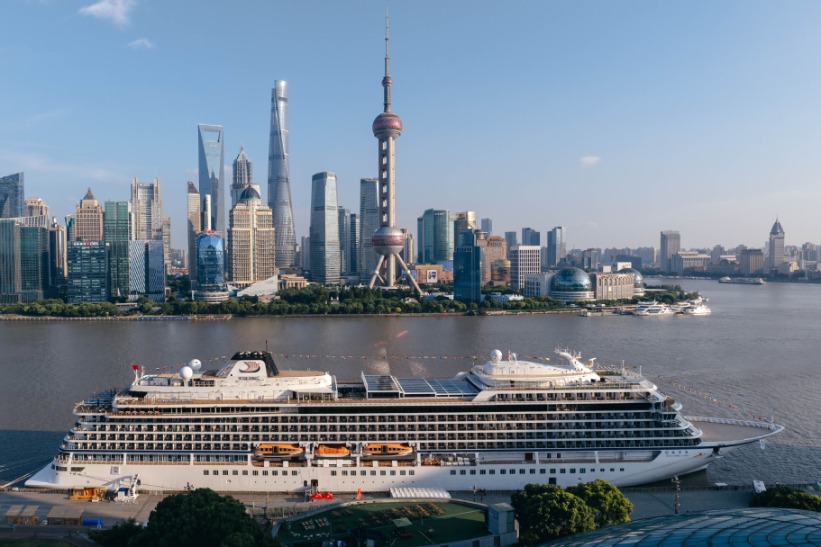Hilton sanguine on tourism recovery


The nation saw the 600th Hilton hotel opened recently in Nanjing, Jiangsu province. The global hospitality company is steadfast in its commitment to accelerating further expansion, banking on the thriving tourism market, according to a top Hilton executive.

Qian Jin, president of Hilton Greater China and Mongolia, emphasized the significance of China as its second-largest market globally after the United States.
"As one of the fastest-growing international hotel groups in China, Hilton has opened 100 new hotels annually over the past four years. This rapid expansion showcases our collaborative efforts, a pace we proudly refer to as 'Hilton speed'," he said.
According to JLL, a leading provider of commercial real estate solutions, this year has seen a significant increase in Chinese travelers, driving a strong uptick in domestic tourism. During the eight-day holiday starting in late September, the number of domestic trips increased by 4.1 percent from 2019 levels, and tourism revenue grew 1.5 percent from the same period in 2019.
Leisure demand has dominated the tourism sector, but there has also been growing demand for business and MICE (meetings, incentives, conferences and exhibitions) activities, indicating a gradual recovery and diversification in the types of travelers visiting the region, said the Ministry of Culture and Tourism.
Hilton's most recent opening in Niushoushan in Nanjing is designed to cater to both business and leisure visitors. It signifies the hotelier's robust presence in China, boasting 600 hotels in operation in over 200 areas.
Hilton's portfolio in China includes 12 out of its total 22 brands, covering luxury, lifestyle, full service and focused service offerings.
In 2023, the Hilton Hotels & Resort brand introduced properties in key urban and sought-after destinations for both business and leisure travelers, reaching a total of more than 70 properties in the country.
Hilton's upscale brands, Waldorf Astoria and Conrad Hotels and Resorts, continued to see significant growth with new openings in major cities such as Shanghai, Suzhou in Jiangsu, and Hainan province's Haikou. At present, there are 18 operational properties and nearly 20 in the pipeline under these luxury brands.
The company's lifestyle brands — Curio Collection, Motto and Canopy — opened new locations in Hong Kong, Taipei and Shanghai this year.
Hilton's rapid growth in China has been driven by a mix of operating models ranging from managed, franchised and master license agreements, fueling the expansion of Hilton Garden Inn, Hampton and Home2 Suites.
In nine years, Hampton has established over 330 hotels in China, hosting more than 30 million guests. More than 60 Hilton Garden Inn hotels are located along high-speed railway routes in key cities.
Home2 Suites has already opened over 40 properties. The franchise model is now being extended to full-service brand DoubleTree.
Its memberships have grown. Hilton Honors, the loyalty program, has increased by over 56 percent year-on-year in membership in China, the company said.
Hilton closely monitors travel trends that resonate with Chinese travelers.
"We are attuned to evolving destination and emerging travel preferences," said Qian, highlighting growing popularity of snow and ice tourism, health-focused leisure trips and cities with intangible cultural legacies.
The company this year developed a program that celebrates China's cultural heritage assets across its 130 hotels in more than 20 provinces.
Travelers today in China have keen interests in cultural and culinary experiences, with more than 93 percent surveyed expressing a desire to learn more about traditional Chinese historical and cultural legacies. More and more, young Chinese travelers prioritize privacy and independent lifestyles during their trips, said Qian.
Recognizing this shift, Hilton has implemented digital keys and eased check-in services, offering connecting rooms for guests seeking individual spaces.
The company leveraged digital innovation, connecting tourists through WeChat or the hotel's own official mobile application. A customer promise program was piloted, which integrates Hilton's global system with WeChat and enables seamless interaction between guests and hotels, said Qian.
The hotel group's collaboration with key players like online travel platform Fliggy extends its reach to popular domestic tourist destinations and international hotels.
"We are hoping our hotels will serve as a bridge, delivering Chinese tourism, lifestyles and culture, while fostering international hotels within the group to understand more about the needs of Chinese visitors."




































